Who defines Black Women?
By Charlene Muhammad -National Correspondent- | Last updated: Jan 3, 2012 - 4:29:44 PMWhat's your opinion on this article?
The Final Call takes a look at the status of Black women, examines their images, influences, challenges and their future
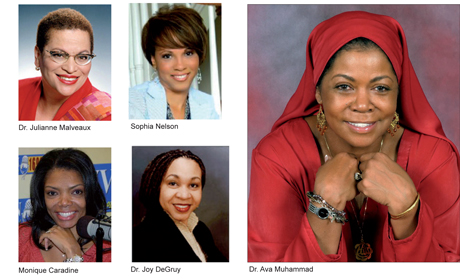
'When I reflect on Black women and images, the first thing that enters my mind is the portrayal of them through media images as self-hating, angry, miserable, and vindictive. All of those characterizations are fictitious and derive from Western America’s foundation of White supremacy, as the Honorable Minister Louis Farrakhan has so clearly demonstrated and proven.' —Dr. Ava Muhammad, attorney and Nation of Islam student minister |
(FinalCall.com) - Black women are devoted wives, mothers, educators, attorneys, doctors, authors, airplane pilots and astronauts. But they cannot escape negative myths surrounding their images, and facts-turned-fiction that impact their status, influence, challenges and future.

Singer Beyonce Knowles introduces “Beyonce Live At Roseland:
The Elements of 4” live concert film at a special screening for fans at the Paris Theatre on Sunday, Nov. 20, 2011 in New York. Photo: AP Wide World Photos/Evan Agostini)
|
“When I reflect on Black women and images, the first thing that enters my mind is the portrayal of them through media images as self-hating, angry, miserable, and vindictive,” said Dr. Ava Muhammad, an attorney and Nation of Islam student minister.
“All of those characterizations are fictitious and derive from Western America’s foundation of White supremacy, as the Honorable Minister Louis Farrakhan has so clearly demonstrated and proven,” Dr. Muhammad told The Final Call.
The fictitious concept of White supremacy says Caucasians are inherently superior spiritually, intellectually and morally to darker peoples of the earth and an aggressive effort was required to sustain that illusion, Dr. Muhammad explained.
The Black female is at the core of their plan and had to be portrayed as subhuman to bring a people down, she said.
Society’s portrayals of Black women fall into one of three categories, said Dr. Muhammad: an over-sexed woman on display and in search of loveless trysts with males; a step above a dog or a cat, focused on physical assets alone, such as hair, make-up and tight clothes; or as an obese, miserable, angry, unattractive, manless female, who thus hates the world.
“All of what we believe that we are has been colored by and impacted by history,” said Dr. Joy DeGruy, researcher, educator, and author of “Post-Traumatic Slave Syndrome: America’s Legacy of Enduring Injury and Healing.”
People forget there are institutions working to perpetuate images that make White America feel comfortable, Dr. DeGruy told The Final Call.
An often-criticized institution is the entertainment industry, wrought with scantily clad, “bootylicious,” rump-shaking females on music videos. Critics have battled artists, producers and networks to promote better images of young Black women, but women collectively must take accountability for what’s put out about them, scholars say.
That’s why there was no contradiction for Tonja Styles to become president of Hip-Hop icon Snoop Dogg’s Chicago chapter of his Snoop Youth Football League. “The burden is not on our men to change toward us. The burden is on us to change toward ourselves,” she said.

|
“We don’t have to be a video vixen ... We don’t have to settle for dancing around in our underwear, hoping that a man will ‘make it rain’ on us in a video. We can be the rainmakers of this industry. But our young girls need to see women in positions of leadership in this industry and not just eye-candy,” Ms. Styles said.
The genesis of negative images is as old as Black women’s history, said Dr. Julianne Malveaux, president of Bennett College for Women in Greensboro, N.C.
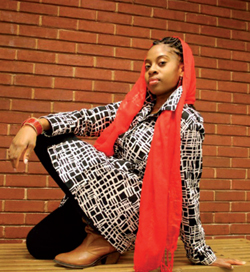
Songstress Akilah Muhammad
'There are artists like India Arie, Erykah Badu, and Jill Scott who have clean, positive messages but those like Beyonce, Nicki Minaj and Rhianna sell because that’s all young people see before them.' —Akilah Muhammad |
Such dehumanization reared its ugly head when people attempted to caricature Mrs. Obama with the New Yorker cover, Dr. Malveaux said.
“She’s got a big afro and is power to the people,” she said referring to the July 2008 cover illustration of President and Mrs. Obama. “No! She’s the first lady of the United States but it’s the attempt to basically caricature Black women,” Dr. Malveaux insisted.
On the other end of the spectrum fell singer Rhianna, who recently made news headlines after Jackie, a Dutch magazine, published an article titled, “N---a B---h,” referring to her style and fashion.
“People feel free to say these things about Black women in ways that they don’t about other women and Blacks have not readily defended themselves,” Dr. Malveaux said.
“Very rarely are we presented as intelligent, moral leaders,” said Dr. DeGruy. Rather, the images are of Black women in “Amos-n-Andy” (the so-called Black situation comedy that ran in the 1920s-50s), such as Sapphire, the lustful whore image, or the overbearing, ignorant Black woman who oppresses her man.
“People gravitate to images and some even compare themselves to what they see but the problem is many women have image and self-esteem issues based on what’s projected in mainstream media and to some extent, that’s very unrealistic,” said Ebony Muhammad, publisher of Hurt2Healing Magazine.
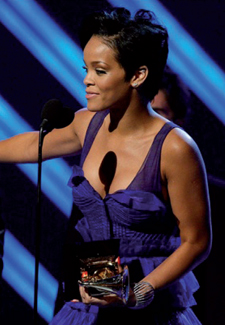
Rhianna at the 50th Grammy awards.
|
“As the Honorable Minister Louis Farrakhan said, Obama was selected before he was elected and you have a music industry and those that they put out in front that have been selected to be the image of Black women, what beauty is, what we think, feel, and behave when in fact, that’s really not it,” Ebony Muhammad said.
The female deserves reverence and honor as a serious co-creator with God but the enemy wanted her dumb, Min. Farrakhan stated during a Sept. 11, 2011 lecture at Mosque Maryam entitled, “The Divine Value of Women.”
“The enemy wants you to think nothing of yourself, so the enemy strips you of your real nature. He has denatured the female and the male and anytime somebody denatures you, they have devalued you. So right now as a woman or as a Black man, you are not valued, and the worst part of that is, you don’t value yourself,” Min. Farrakhan said.
He continued, “God cannot make us the head if the woman is not lifted. If God does not lift the woman, the man will never come up, so if God is going to make a new world and a better world, He is going to make that world coming through a woman.”
A collective task is to also lift the scientific foundation of the negative stereotypes and images of Black women, scholars say.
Some of those base images were formed by mostly Southern, prestigious White males, according to Harriet Washington, author of “Medical Apartheid: The Dark History of Medical Experimentation on Black Americans from Colonial Times to the Present.”
Nineteenth century scientists portrayed Black women as oversexed Jezebels, the very opposite of White women—supposedly fierce mothers and beautiful, chaste beings who didn’t like sex, she explained.
“What they said about Black people was so potent and influential that it still governs our ideas today, even among Black people,” Ms. Washington told The Final Call.
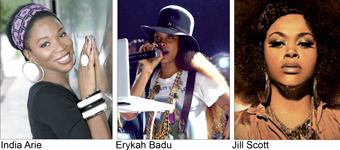
'The journey for us is in conquering self and understanding that we are beautiful. We are valuable. We should be loved. We should be touched. We should be cared for. We have feelings. We get to have a sick day like everybody else too and we don’t have to be always on, always strong, always this, always that.' —Sophia Nelson, Author |
Akilah Nehanda Muhammad produced “Best in the World,” an uplifting song and video featuring young, Black women and men, in hopes of turning the tide of what’s created for, about, and fed to her generation.
“Youth just aren’t listening to the older, cleaner artists anymore ...That generation gap is forming and they’re listening to Beyonce, Nicki Minaj, and Rhianna and those three sisters, their image is not necessarily the best for us,” Akilah Muhammad said.
“The images can be reversed when Black women who have awakened to their true consciousness grow in numbers, create their own images, and avoid what their enemy tells them they should be,” said Tamorah Muhammad, who developed Modest Models, Inc. to promote modesty and female empowerment.
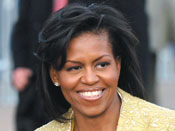
First Lady Michelle Obama
|
“The journey for us is in conquering self and understanding that we are beautiful. We are valuable. We should be loved. We should be touched. We should be cared for. We have feelings. We get to have a sick day like everybody else too and we don’t have to be always on, always strong, always this, always that,” Ms. Nelson said.
It’s also about getting back to femininity and dignity, and Black women simply must replace anything they do not want, said Audrey Muhammad.
“We just have to have a righteous version of it and it should be everywhere that you look, women of virtue and us being vigilant in our dedication to help show positive images of women,” she said.
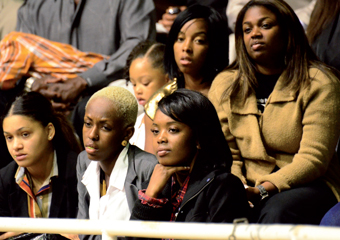
Black Women listen to the Honorable Minister Louis Farrakhan's message at Prairie View A&M.
|
“I believe with my whole heart that Black women are the most boldest, most beautiful, most fearless, courageous and powerful people on this planet. Unfortunately, we haven’t realized it fully and fully embraced it yet,” she said.
Her manifesto calls on Black women to strive for better health, strive in the best interest of their children, show restraint and respect for others’ marriages, raise their standards and levels of expectation in relationships, and vigorously protect their images in the media, among other things.
“Our girls are in danger. If anybody else were facing the kinds of issues we’re facing, it would be a state of emergency,” Ms. Caradine said, referring to staggering HIV and breast cancer statistics.
Outrage from Black women and others caused Psychology Today to remove from its website an article by Dr. Satoshi Kanazawa (“Why Are Black Women Less Physically Attractive Than Other Women”), posted in May 2011.
He could put forth something like that because the standard of beauty usually is blonde or brunette, and that leads to issues with hair among Black women, said Dr. Malveaux.
“I do believe the way that one wears one’s hair is one’s choice and it does not have to be political. At the same time, I think that we should show more ranges of hair styles because the prevailing image on videos is the long hair, weaves, and all that mess,” she said, adding that she often sees the dichotomy of young women struggling to pay their college tuition and struggling to find money to put their weave in.
The weaves, blonde hair, wigs, contact lenses, heavy make-up, and adjusted noses are part of society’s projection of Black professional women seen in corporate America and more pervasively in the entertainment world, said Dr. Muhammad.
“It demonstrates a complete rejection of the natural self. That’s not to say we should not groom ourselves because the other side of that is if you look at the White female, they devote quite a bit of time and money to imitating the Black female form,” whether it be developing a derrier, getting lip injections or frequenting tanning salons, Dr. Muhammad said.
But Black women copy White women’s styles primarily because they are mass-marketed by a White-dominated society.
The return to original womanhood and the top of civilization is to “accept your own and be yourself and understand that a nation can rise no higher than its woman,” Dr. Muhammad said.
(For more extended coverage of the fact, fiction and myths around Black woman’s images, visit Charlene Muhammad’s Facebook Page.)
Related news:
Men of This World Do Not Desire A Righteous Woman (FCN, 09-12-2000)
Hollywood's New Sodom & Gomorrah persona (FCN, 09-07-2011)
The Real Housewives of Detroit? (FCN, 05-04-2011)
The Psychology of Exploitation: Black Women In Entertainment (FCN, 04-06-2011)
[Video] A Girl Like Me (Kiri Davis)
The Divine Nature & Value of Women (FCN)
Spelman student starts letter writing campaign to BET and TV One (FCN, 05-06-2007)
Winnie Mandikizela-Mandela: Being A Black Woman In The World - Pt 1 (FCN, 03-28-2006)
Media images of Black women: From soft porn to the invisible soldier (FCN, 10-04-2003)
INSIDE STORIES AND REVIEWS
-
-
About Harriett ... and the Negro Hollywood Road Show
By Rabiah Muhammad, Guest Columnist » Full Story -
Skepticism greets Jay-Z, NFL talk of inspiring change
By Bryan 18X Crawford and Richard B. Muhammad The Final Call Newspaper @TheFinalCall » Full Story -
The painful problem of Black girls and suicide
By Charlene Muhammad -National Correspondent- » Full Story -
Exploitation of Innocence - Report: Perceptions, policies hurting Black girls
By Charlene Muhammad -National Correspondent- » Full Story -
Big Ballin: Big ideas fuel a father’s Big Baller Brand and brash business sense
By Bryan Crawford -Contributing Writer- » Full Story






 Click Here Stay Connected!
Click Here Stay Connected!








